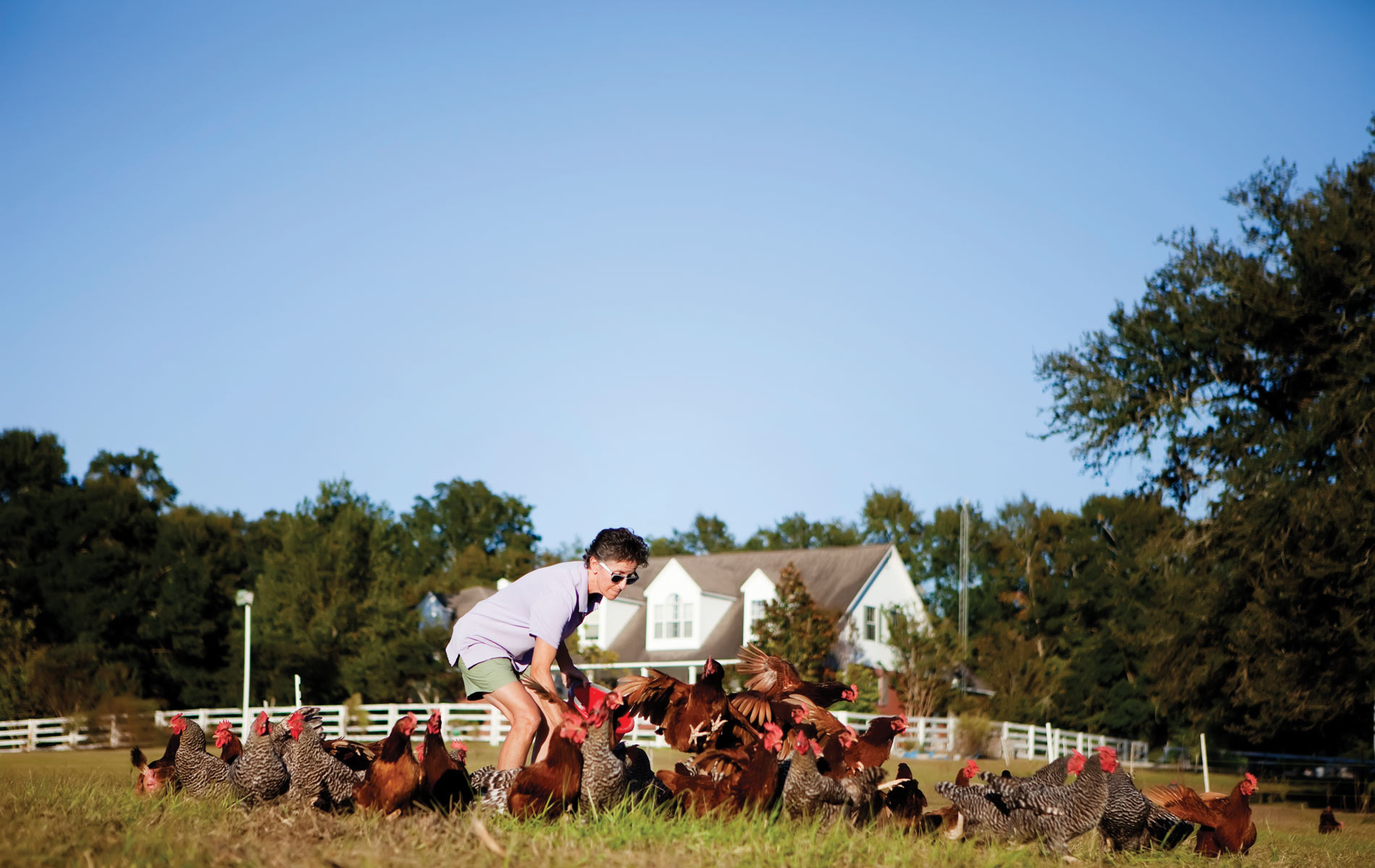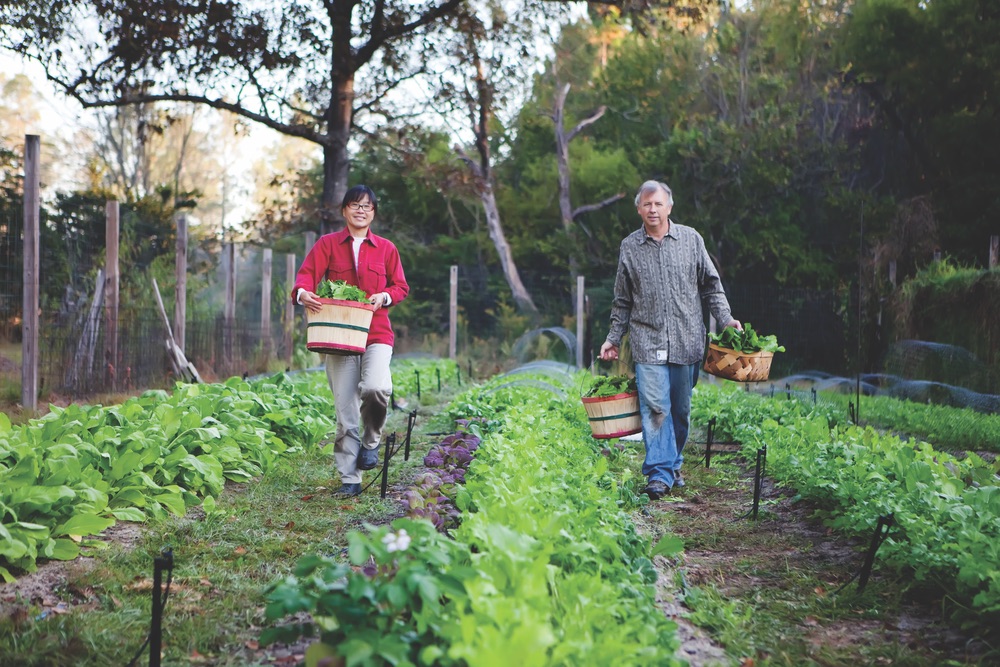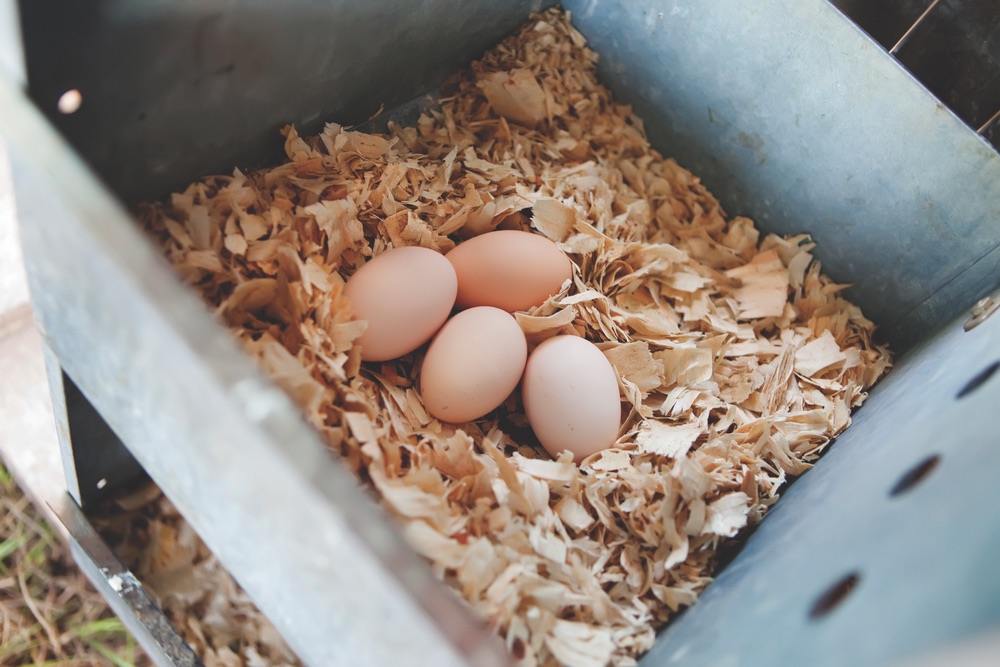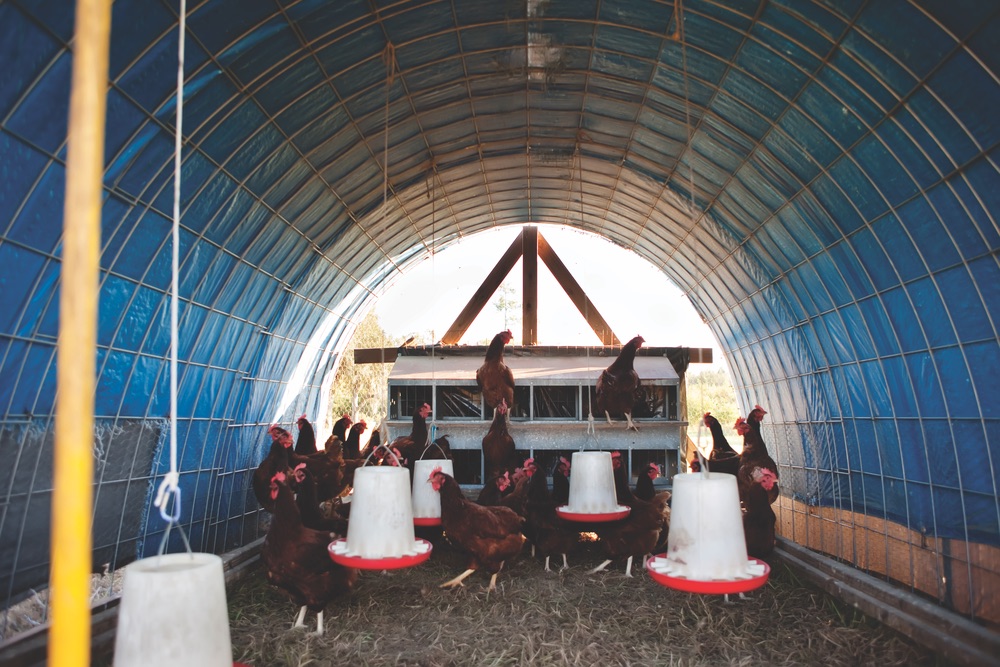
vie-magazine-organic-feature
Organic Pioneers
A Return to Sustainable Local Living
By Alex Peet | Photography by marla and shane photographers
During the recent imbroglio over how—or whether—to reform our nation’s health care system, politicians from left and right found little on which they could agree. Yet, amid all the heated rhetoric, there was one pressing issue that was not seriously in dispute: the burden placed upon our health care system and government finances by the cost of treating the chronic illnesses that Americans acquire as they age, which are often the product of a poor diet, one that reflects our fast-paced culture of convenience and commercialization. While it is undoubtedly comforting that this particular problem is widely acknowledged across the ideological spectrum, given the hyperpolarized times in which we live, what is perhaps more encouraging is that there exists at this moment a movement that seeks to improve our collective health by changing Americans’ eating habits. The adherents of this movement advocate the consumption of food grown locally, and organically when possible, on small family farms that sell their wares directly to consumers at farmers markets and other local venues. They believe that by in effect downsizing our food system—moving from a global to a locally or regionally based food economy—and limiting the use of chemicals and additives in the food production process, we can restore our collective health, improve our economy and enhance the natural environment.
Here in Northwest Florida, we have grocery stores that sell local organic goods, such as For The Health Of It, located on Highway 30-A in Blue Mountain Beach, a bustling farmers market held every Saturday in Seaside, and, most important of all, a few intrepid farmers who count themselves part of the organic and local food movement. One of these pioneering farmers is Charles Bush, who, with his wife Shueh-Mei, operates Dragonfly Fields, located just a few miles north of DeFuniak Springs. Along with Charles, there is Renee Savary, owner of Twin Oaks Farm, located just outside of Bonifay. Both Charles and Renee are committed to organic production practices and to a vision of a viable, sustainable local food economy. Their motivations are manifold—environmental, health and economic—and their success has been steady, mirroring the growth in the movement of which they are a part. But before I tell you more about the efforts of Charles and Renee, perhaps some background on the organic and local food movement is in order.
The local and organic movement took early inspiration from Chef Alice Waters, whose Chez Panisse restaurant—considered a temple of gastronomy in the United States—has used organic and locally produced goods since it opened in Berkeley, California in 1971. Another influence is found in the environmental movement that sprang up from 1960s political idealism and led to a heightened awareness of the costs of environmental degradation, including an awareness of the effect a poor environment can have on public health. Perhaps the most important, and effective, catalysts of late have been the writers Michael Pollan, author of celebrated foodie tomes such as In Defense of Food, and Eric Schlosser, who wrote a fast-food industry exposé entitled Fast Food Nation and, along with Mr. Pollan, had a hand in the recent much-admired documentary Food, Inc. These writers advocate the consumption of locally sourced and organic foods and extol the virtues of meals cooked and enjoyed in the comfort of one’s own home. Pollan’s motto—“Eat food. Not too much. Mostly plants.”—has become something of a rallying cry for foodies everywhere.

The organic and local food movement’s vitality is reflected in the ever-expanding sales of organic products and in the cultural cachet the movement now has among food-conscious Americans. Retail sales figures for organic products have increased twenty percent or more annually since 1990, according to the U.S. Department of Agriculture. And the Organic Trade Association reports that sales of organic food and beverages reached twenty billion dollars in the United States alone in 2007. Also, the number of operating farmers markets in the United States, very often the main venue at which small organic farmers sell their wares, has grown from 1,775 in 1994 to 4,685 in 2008, according to the USDA. Perhaps surpassing all other indications of the mainstreaming of the local and organic food movements, however, was the recent news that First Lady Michelle Obama and White House chef Sam Kass have planted a 1,100-square-foot organic garden on the White House lawn, where they are growing fruits, vegetables and herbs for use in the White House kitchen.
The federal government’s National Organic Program regulations, which dictate the cultivation practices of farmers who seek to market their products as “certified organic,” represent an attempt to enforce the environmental and dietary views of the local and organic movement. These regulations prohibit organic farmers from growing crops with the aid of the synthetic pesticides, herbicides and fertilizers that conventional farmers use to fend off bugs, control weeds and spur plant growth. The regulations also prohibit organic meat producers from administering hormones and antibiotics—which conventional meat producers use to speed their animals’ growth, increase their size, and stave off illness—to livestock they market as organic.

If you ask organic farmers and consumers why they would choose to abandon the products that have made food so abundant in our nation—an abundance that previous generations could not take for granted—they will inform you that the pesticides and herbicides used in conventional farming have been cited as culprits in certain cancers, neurological disorders, and reproductive disorders. They will also point out that the synthetic fertilizers employed by conventional farmers are thought to play a role in the formation of “dead zones”—regions of water that are low in oxygen and thus cannot support life—when they escape from fields as runoff and drain into rivers and oceans. And, in case you are not yet convinced, organic advocates will offer up the fact that the antibiotics conventional meat producers give to their animals—used to eliminate the spread of disease that inevitably results when animals are raised together in closely confined spaces—have been cited as a factor in the rise of antibiotic-resistant strains of certain viruses, which appear in both animal and human populations.
Another point of contention local and organic food advocates have with our current, largely industrialized food system is its need for ever more fossil fuels to keep us flush with food. They are troubled by the knowledge that our food production system currently requires more fossil fuel than any other sector of the economy after cars, the burning of which emits greenhouse gases into the atmosphere that are attributed to climate change. Local and organic food advocates also find fault in the fact that our increasingly globalized food system, which has the admitted virtue of enabling us to eat out-of-season fruits and vegetables shipped to our local supermarket from distant locales, assumes the continued availability of a steady supply of cheap fossil fuels. With the rise of China and India, many organic and local advocates believe fossil fuels are unlikely to remain in abundant supply, and they see a revitalization of local and regional food economies as a safeguard against an uncertain energy future and as insurance for our long-term food security.
You may now be asking yourself, how exactly would these food revolutionaries like to change things? What would their vision entail? If given free rein, organic and local food advocates would replace our current food production system with one in which farmers grow food in a manner that limits the use of fossil fuels—by both limiting the distance the food travels to reach consumers and limiting the inputs applied to crops to those derived from non-fossil-fuel-based sources; organic and local food advocates would also like to ensure that a healthy living environment is afforded to the animals we raise for meat, egg, and milk consumption; and, finally, organic and local food advocates seek a food culture in which a farmer-consumer relationship is cultivated and sustained. This last point—the farmer-consumer relationship—is at the core of the local ethos, an ethos that views the reestablishment of a relationship between farmer and consumer as the sine qua non of a reformed, revitalized food economy. The enthusiasm among what are termed “locavores” for the farmer-consumer relationship derives from their belief that through this relationship there develops an attention to our food, our diet, our environment, and, ultimately, our collective health, that is absent in today’s culture.
It is precisely this regulatory ambiguity and its effect—the permissibility of marketing animal products as free range, leading consumers to believe that the animal spends most, if not all, of its time outdoors, when typically this is not the case—that goes to the heart of the importance local food advocates place upon the farmer-consumer relationship.
Renee Savary, who raises organic chickens and ducks for meat and eggs at Twin Oaks Farm, has ninety-four acres of land just above Bonifay on which to employ her vision of organic and local sustainability. Renee began operations at Twin Oaks three years ago, and her products were certified organic only a few months after she started the business. Yet, Renee believes her production practices and products actually improve upon the requirements of the federal government’s National Organic Program. First, Renee considers the breeds of chicken she raises for meat and eggs—known as heritage breeds because they have historically been bred to adapt to the local conditions in which they are raised and thus exhibit a wide genetic diversity—to be superior to the Cornish Cross breed raised by most conventional and organic chicken producers today. She grounds this conviction in the fact that the Cornish Cross chicken has been bred solely for its ability to be raised in a confined animal feeding operation—large buildings in which hundreds or thousands of chickens are kept in close captivity for five to six weeks, usually without the ability to go outdoors. Because of this breeding, Cornish Cross chickens lack legs strong enough to support their fattened frames and are thus unable to forage or escape from predators. In stark contrast with the physical limitations of the Cornish Cross breed, Renee’s heritage breed chickens—and her ducks—roam outdoors regularly and forage with abandon. On the day Renee receives her chickens and ducks, just a few days after they are born, she begins them on a diet of organic feed. Soon they are traversing her property, strutting across the organic Bahia grass that coats the expanse of land set out before her veranda, where they catch the occasional worm that makes an untimely appearance on the grass.
It is this freedom to roam that provides the second basis upon which Renee distinguishes her chickens and her ducks from even those that are certified organic and labeled “free range.” Rather than free range, her animals are, she likes to say, “free roaming.” Although the free-range designation implies an improvement upon the fate of a conventionally raised chicken, it by no means ensures that a chicken will spend significant time outdoors, as the governing USDA regulations merely require that animals raised free range have access to the outdoors. It is precisely this regulatory ambiguity and its effect—the permissibility of marketing animal products as free range, leading consumers to believe that the animal spends most, if not all, of its time outdoors, when typically this is not the case—that goes to the heart of the importance local food advocates place upon the farmer-consumer relationship. Through this relationship, it is hoped, consumers can learn directly from a farmer how he or she raises animals and cultivates crops and, in so doing, gain a level of knowledge about the food they consume that is unattainable in the grocery store aisle.

This farmer-consumer relationship is something Renee both prizes and nurtures. She has an opportunity to further this relationship every Saturday, when she sets up a booth at the Seaside Farmers Market, where she educates her customers about the virtues of her own production practices and about the benefits of what she calls “real food.” Her desire to produce “real food” for her local community was formed during her years living in Miami Beach, by way of her native Switzerland, where she tended a garden and read books about European farmers utilizing biodynamic methods—a holistic farming approach in which the farm itself is treated as a unified organism—along with books written by the current crop of “agri-intellectuals” such as Michael Pollan. Considering the passion with which Renee speaks about her quest to raise organic ducks and chickens, I feel obligated to mention the irony in the fact that she spent many years as a vegetarian. But perhaps this irony recedes when one learns of her firmly held belief that modern food production methods remove the pleasures that should come with our consumption of food. During those years as a vegetarian, Renee found nothing appetizing or pleasurable in the meat to which most of us have grown accustomed. But now, raising animals in a way that is consonant with her own environmental values and culinary preferences, Renee has rediscovered the pleasure of eating meat. This rediscovered pleasure, and the belief that it can be had while preserving human and environmental health, motivates Renee—to educate, to provide an enhanced product to her customers, and to profit—in spite of the challenges attendant to starting a new business in a difficult economic environment.
Charles Bush, of Dragonfly Fields, is motivated by the same passionate devotion to the local and organic ethos that propels his fellow farmer, Renee Savary. While his products are not certified organic pursuant to the federal government’s National Organic Program—only because Charles has chosen not to seek certification—everything Dragonfly Fields produces is cultivated in complete accord with organic principles. Charles grows a variety of fruits and vegetables—strawberries, onions, lettuces, beets, potatoes, collards, and tomatoes—without the synthetic pesticides, herbicides and fertilizers employed by conventional farmers. To fend off pests, increase soil fertility, and limit weeds without such products, Charles uses many different natural techniques, some sophisticated, others simply laborious. In the winter months, he plants cover crops, such as clover, winter rye and beans, which introduce nitrogen into the soil naturally—thereby increasing the soil’s fertility without the need for synthetic fertilizers—and have the added benefit of crowding out otherwise available space for weeds to grow. These cover crops also serve to introduce new insects into Charles’s farm ecosystem. While one might think that introducing new insects into a farm would be a dangerous proposition, Charles views the right insect as a blessing. Such an insect can help pollinate crops during the spring and summer months and, if Charles is lucky, it will prey upon pests that would otherwise be a threat to the crops he grows. As an additional means of improving soil fertility without synthetic fertilizer, Charles applies compost to his crops. The compost that Charles uses, which is simply decomposed organic matter, gives new meaning to the word “recycled.” To create the compost, he collects scraps of food waste from local restaurants, which then sits in piles on the grounds of Dragonfly Fields in various stages of decomposition. Once it is suitably decomposed, he plows this nutrient-dense substance back into his soil and reaps its benefits.
Charles’s decision to become an organic farmer sprang from his years of travel and exposure to farmers markets in California and Europe, a well-honed environmental ethic and an innate curiosity. This curiosity motivates him to continually build upon his knowledge of organic production practices with the aim of growing fruits and vegetables that are fresh to the taste and nutritionally dense.
Charles’s commitment to a local food economy and organic farming practices has endeared him to a select group of local chefs, who gladly purchase as much of his produce as they can use. Charles developed his relationships with these chefs through years spent in the restaurant business and in wine sales. He has also lately been seen at the Seaside Farmers Market alongside Renee Savary, where he offers his sought-after products to those lucky enough to catch him when he hasn’t sold everything he has grown to the local chefs who are his regular customers. Charles’s decision to become an organic farmer sprang from his years of travel and exposure to farmers markets in California and Europe, a well-honed environmental ethic and an innate curiosity. This curiosity motivates him to continually build upon his knowledge of organic production practices with the aim of growing fruits and vegetables that are fresh to the taste and nutritionally dense. If past is prologue, Charles’s efforts at sustainability, quality and nutritional density will continue to advance with success, to the benefit of all his loyal customers.
Thanks to the efforts of Charles Bush, Renee Savary and others, we are fortunate in Northwest Florida to have access to the bounty of the increasingly prominent local and organic food movement. We are home to business owners—grocers, restaurateurs, and farmers—who have adopted the movement’s tenets and are applying them with success. For now, it is a small but growing band of adherents propelling the movement forward in the face of entrenched ideas and practices, and it’s anyone’s guess if their efforts will result in wholesale changes to our nation’s economy and eating habits. But if organic and local advocates are able to ameliorate our nation’s health, environmental and economic woes by restoring the link between farmer and consumer and developing sustainable local food economies, we will all, irrespective of our political affiliation, be indebted to them.
If you are interested in finding out more information regarding organic farming, here are some links that I recommend:
Michael Pollan – http://michaelpollan.com
Mark Bittman – http://markbittman.com
Politics of the Plate (site run by Barry Estabrook) – http://politicsoftheplate.com
— V —
Alex Peet is an attorney residing in Santa Rosa Beach, Florida.
Share This Story!
KEEP UP WITH THE LATEST STORIES FROM VIE


















































































































































